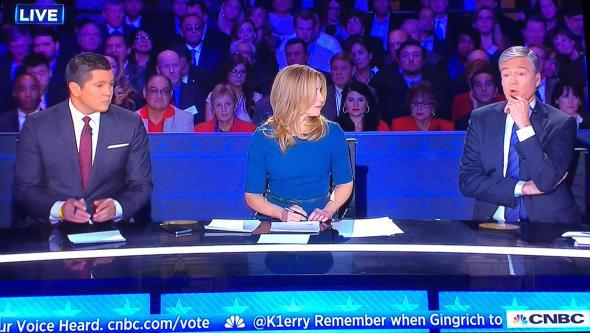Earlier this week, the New York Times ran a headline claiming “CNBC May Be the Big Winner of the Next Debate.” It’s a pity someone at the network didn’t toss salt over his shoulder after reading it.
To watch CNBC during the day is to stumble into a different reality. Talk is fast and screaming is constant. Businessmen are stars who are rarely subject to tough questioning. No one seems to think it odd if an anchor asks one question and an interview subject answers another. Like in a bad movie, people talk past one another, not at one another. I drove cross-country late last summer and gave up on listening to CNBC on Sirius after about a half-hour. Without its visuals, the network was literally incoherent.
I say all that as a way of explaining the Republican debate that CNBC hosted Wednesday evening. The main moderators—John Harwood, Becky Quick, and Carl Quintanilla—appeared to be in a different time zone from Jim Cramer and Rick Santelli, who pitched in with a few questions. Although come to think of it, Quintanilla may have been in a different zone from everyone. Were there tough questions? Sure. In fact, there were more than a few. There were hard queries about H-1B visas, and the candidates’ tax plans. Quintanilla even managed to push Ben Carson on his involvement with Mannatech, the shady multilevel company whose vitamins and other supplements it allowed sales reps to claim cured autism and cancer.
But mostly CNBC’s debate was a mess—and to regular CNBC viewers, a familiar one. How bad was it? Straight-ahead moderators John Harwood and Becky Quick seemed to be broadcasting from Planet Face the Nation, lobbing serious policy questions. Meanwhile, the more flamboyant Cramer and Santelli practically competed for overacting honors.
Cramer all but screamed his question about prosecuting GM executives to Chris Christie, maybe to con his audience into thinking he was playing hardball when he was lobbing a softie.
As for Rick “Tea Party” Santelli:
And:
And as for Quintanilla, his performance managed to remind me almost at once that his finest moment as a journalist was when he got an interview with soon-to-be-indicted $8 billion Ponzi schemer Allen Stanford and asked him, “Is it fun being a billionaire?” He opened the debate with this less-than-serious question:
This series of debates is essentially a job interview with the American people. And in any job interview, you know this: You get asked, “what’s your biggest weakness? So in 30 seconds, without telling us you try to hard, or that you’re a perfectionist, what’s your biggest weakness and what are you doing to address it?”
John Kasich went first. He didn’t answer the question.
Not long after, Quintanilla allowed Ted Cruz to score major applause by attacking the moderators for pitting the candidates against one another, claiming they had gone easy on Clinton, Sanders, and all the rest during the Democratic debate. No one pointed out that the Democratic show was on CNN, not CNBC. Maybe they were too stunned by the Cruz’s use of the word Menshevik in relation to the other team’s debate.
To be fair, Quintanilla had asked about the budget agreement reached in Washington this week. Then again, he didn’t ask the question he thought. He asked Cruz if his opposition to it demonstrated that he was not a “problem solver.” When Cruz went on the attack, Quintanilla pushed back by claiming, “I asked you about the debt limit and I got no answer.” Well, no, he didn’t.
There were several major follow-up fails. When asked about retirement policy, Carly Fiorina argued that the federal government has no business setting a minimum wage. She wasn’t asked to elaborate. When Rubio was asked about his somewhat-shabby personal finances, and mentioned he owned a home near his parents, no one thought to ask about his history of buying homes with zero-percent-down loans.
There was nothing Quick or Harwood—who generally remained calm and managed to ask decent questions—could do to make up for this circus.
All in all, CNBC feels like a guest who stayed at the party too long. Its stock ticker was the signature visual of the dot-com-boom era. Even in 2008, it managed to average between 250,000 and 300,000 viewers during its prime weekday morning and afternoon viewing times. Now it’s notching less than half that, and the network has been reduced to claiming that even people who are in the presence of a television tuned into the network at a broker’s office or hotel gym count as viewers.
Jim Cramer has never really recovered from Jon Stewart’s evisceration of his on-air work. Maria Bartiromo, the Money Honey, has decamped for Fox Business. And a debate that the network hoped could revive its mojo only revealed how over the hill it truly is. No doubt CNBC got ratings Wednesday evening. But I highly doubt that what transpired on air convinced any new viewers they should tune back in.
